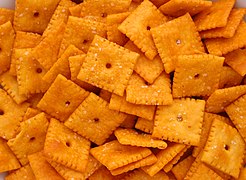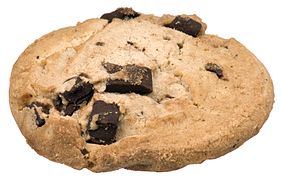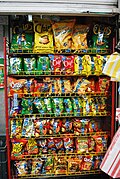Snack
| Part of a series on |
| Meals |
|---|
 |
Meals |
|
Components and courses |
|
Related concepts |
|

Trail mix is a classic snack food; here it is made with peanuts, raisins, and M&M's

A picture of some low-calorie fruit and vegetable snacks, including apples, asparagus, beetroots, bell peppers, endives, and tomatoes.
A snack is a small service of food, and generally eaten between meals.[1] Snacks come in a variety of forms including packaged snack foods and other processed foods, as well as items made from fresh ingredients at home.
Traditionally, snacks are prepared from ingredients commonly available in the home without a great deal of preparation. Often cold cuts, fruits, leftovers, nuts, biscuits, sandwiches, chocolate, popcorn and sweets are used as snacks. The Dagwood sandwich was originally the humorous result of a cartoon character's desire for large snacks. With the spread of convenience stores, packaged snack foods became a significant business. Snack foods are typically designed to be portable, quick, and satisfying. Processed snack foods, as one form of convenience food, are designed to be less perishable, more durable, and more portable than prepared foods. They often contain substantial amounts of sweeteners, preservatives, and appealing ingredients such as chocolate, peanuts, and specially-designed flavors (such as flavored potato chips).
Beverages, such as coffee, tea, are not generally considered snacks though they may be consumed along with or in lieu of snack foods.[2]
A snack eaten shortly before going to bed or during the night may be called a (mid)night snack.
Contents
1 Snacks in the United States
2 Snacks and health
2.1 Nutritional concerns
2.2 Snacks and cognition
3 Types of snack foods
4 Image gallery
5 See also
6 References
7 Further reading
8 External links
Snacks in the United States
In the United States, a popular snack food is the peanut. Peanuts first arrived from South America via slave ships, and became incorporated into African-inspired cooking on southern plantations. After the Civil War, the taste for peanuts spread north, where they were incorporated into the culture of baseball games and vaudeville theaters.[3]
Along with popcorn (also of South American origin), snacks bore the stigma of being sold by unhygienic street vendors. The middle-class etiquette of the Victorian era (1837–1901) categorized any food that did not require proper usage of utensils as lower-class.[3]
Pretzels were introduced to North America by the Dutch via New Amsterdam in the 17th century. In the 1860s, the snack was still associated with immigrants, unhygienic street vendors, and saloons. Due to loss of business during the Prohibition era (1920-1933), pretzels underwent rebranding to make them more appealing to the public. Packaging revolutionized snack foods, allowing sellers to reduce contamination risk, while making it easy to advertise brands with a logo. Pretzels boomed in popularity, bringing many other types of snack foods with it. By the 1950s, snacking had become an all-American pastime, becoming an internationally recognized emblem of middle American life.[3]
Snacks and health
Healthy snacks include those that have significant vitamins, are low in saturated fat and added sugars, and have a low sodium content. [4] Examples of healthy snacks include:
- Foods that have whole grains[4]
Fruits and vegetables[4]
Nuts and seeds[4]
- Low-fat dairy products[4]
- Lean meats,[5]eggs, such as hard-boiled eggs,[5] and lean cheese
Nutritional concerns
Government bodies such as Health Canada recommend that people make a conscious effort to eat more healthy, natural snacks - such as fruit, vegetables, nuts, and cereal grains – while avoiding high-calorie, low-nutrient junk food.[6]
A 2010 study showed that children in the United States snacked on average six times per day, approximately twice as often as American children in the 1970s.[7] This represents consumption of roughly 570 calories more per day than U.S. children consumed in the 1970s.[8]
Snacks and cognition
A Tufts University Department of Psychology empirical study titled "Effect of an afternoon confectionery snack on cognitive processes critical to learning" found that a consumption of a confectionery snack in the afternoon improved spatial memory in the study's sample group, but in the area of attention performance it had a mixed effect.[9]
Types of snack foods
- Almonds
Apple slices
Bagel with cream cheese
- Bitterballen
Bread/toast with butter, honey, jam, or other spread
- Candy bar
- Carrot Chips
- Cashews
- Cheese puffs/cheese curls
Cheese, a larger cold prepared snack- Chocolate-coated marshmallow treats
Corn chips and Tortilla chips
- Cocktail sausage
- Cookies
- Crackers
- Deviled eggs
- Doughnuts
- Dried fruits
- Drinkable yogurt
Edamame, fresh or dried- Granola bars
- Falafel
Flour tortilla with a filling- Frozen berries
- Sliced fruit
- Fruit cocktail
- Fruit salad
- Ice cream
- Jell-O
- Jerky
- Kaassoufflé
- Milkshake
Pound cake, in slices- Lunchables
- Mixed nuts
- Muffins
- Papadum
- Peanuts
Pita bread, straight from the packet or toasted- Popcorn
- Pork rinds
- Potato chips
- Pakoda
Pretzels, hard or soft
- Raisins
Ratatouille, served cold, a larger cold prepared snack- Rice cake
- Rice crackers, distinguished from the above
- Saltines
Sandwich, a larger cold prepared snack- Samosa
Seeds (sunflower or seed mix)- Shortbread
- Smoked salmon
- Smoothie
- Teacake
- Toast
- Trail mix
Vegetables (e.g. carrots, celery, cherry tomatoes)- Whole fruit
- Yogurt
Image gallery
A rack of snack foods

Popcorn

Trail mix

Cheese-flavored crackers of the Cheez-It brand

Candy
A candy bar of the Snickers brand

Chocolate chip cookie

Fruit

Potato chips

Pretzels

Doughnuts

A blueberry muffin

Ants on a log

Dutch bitterballen

Peanuts
See also
- Canapés
- Junk food
- List of snack foods
- List of snack foods by country
- List of brand name snack foods
- List of Indian snack foods
- List of foods
- Power snack
- Savoury (dish)
- Snacking
References
^ "Definition of Snack at Dictionary.com". Retrieved 2011-03-13..mw-parser-output cite.citation{font-style:inherit}.mw-parser-output q{quotes:"""""""'""'"}.mw-parser-output code.cs1-code{color:inherit;background:inherit;border:inherit;padding:inherit}.mw-parser-output .cs1-lock-free a{background:url("//upload.wikimedia.org/wikipedia/commons/thumb/6/65/Lock-green.svg/9px-Lock-green.svg.png")no-repeat;background-position:right .1em center}.mw-parser-output .cs1-lock-limited a,.mw-parser-output .cs1-lock-registration a{background:url("//upload.wikimedia.org/wikipedia/commons/thumb/d/d6/Lock-gray-alt-2.svg/9px-Lock-gray-alt-2.svg.png")no-repeat;background-position:right .1em center}.mw-parser-output .cs1-lock-subscription a{background:url("//upload.wikimedia.org/wikipedia/commons/thumb/a/aa/Lock-red-alt-2.svg/9px-Lock-red-alt-2.svg.png")no-repeat;background-position:right .1em center}.mw-parser-output .cs1-subscription,.mw-parser-output .cs1-registration{color:#555}.mw-parser-output .cs1-subscription span,.mw-parser-output .cs1-registration span{border-bottom:1px dotted;cursor:help}.mw-parser-output .cs1-hidden-error{display:none;font-size:100%}.mw-parser-output .cs1-visible-error{font-size:100%}.mw-parser-output .cs1-subscription,.mw-parser-output .cs1-registration,.mw-parser-output .cs1-format{font-size:95%}.mw-parser-output .cs1-kern-left,.mw-parser-output .cs1-kern-wl-left{padding-left:0.2em}.mw-parser-output .cs1-kern-right,.mw-parser-output .cs1-kern-wl-right{padding-right:0.2em}
^ Lat, Jeff. "Sweet Snacks". Blogspot.com. BlogSpot. Retrieved 19 June 2016.
^ abc Carroll, Abigail (2013-08-30). "How Snacking Became Respectable". Wall Street Journal. ISSN 0099-9660. Retrieved 2016-05-29.
^ abcde "What Are Healthy Snacks?" California After School Resource Center. Accessed September 2011.
^ ab "Say Yes to Healthy Snacks!" Illinois Early Learning Project. Accessed September 2011.
^ "Smart Snacking - Canada's Food Guide". Retrieved 2011-03-13.
^ "New Trend Shows Kids Snacking Every Few Hours". Retrieved 2010-03-11.
^ ABC News. "American Diet Then and Now: How Snacking Is Expanding the Country's Waistline - ABC News". ABC News. Retrieved 20 February 2016.
^ Mahoney, Caroline R.; Taylor, Holly A.; Kanarek, Robin B. (2007). "Effect of an afternoon confectionery snack on cognitive processes critical to learning". Physiology & Behavior. 90 (2–3): 344. doi:10.1016/j.physbeh.2006.09.033.
Further reading
- (April 3, 1973.) "America: just one long snack bar." Ellensburg Daily Record. Accessed October 2011.
External links
| Wikimedia Commons has media related to Snack food. |
Wikibooks Cookbook has a recipe/module on
|
Wikibooks Cookbook – A collection of recipes from around the world














